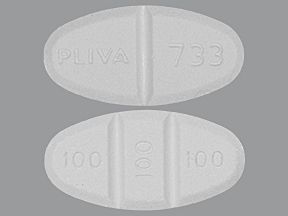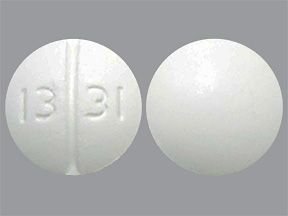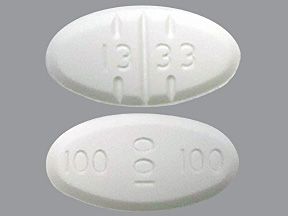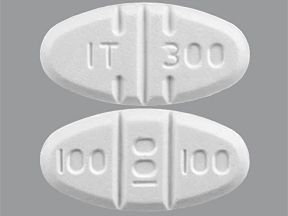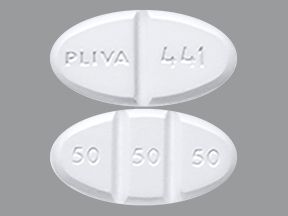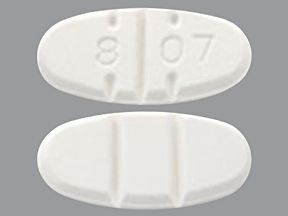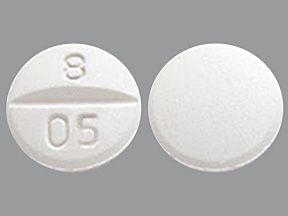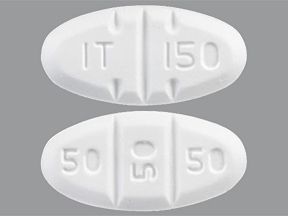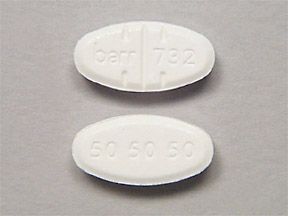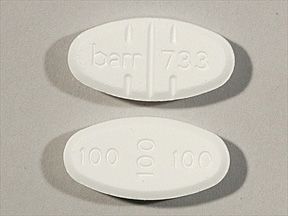Trazodone is a generic prescription drug. It’s FDA-approved to treat major depressive disorder (MDD) in adults. MDD is also called depression.
For details, see the “Trazodone oral tablet use for depression” section below.
Drug details
Trazodone is a type of antidepressant called a serotonin receptor antagonist and reuptake inhibitor (SARI).
Trazodone comes as an oral tablet. It’s available in four strengths: 50 milligrams (mg), 100 mg, 150 mg, and 300 mg.
Brand-name versions
Trazodone is not currently available in any brand-name forms. Desyrel was the brand-name form of trazodone, but it’s no longer available.
Trazodone is a generic drug. A generic drug is an exact copy of the active drug in a brand-name medication. Desyrel is the brand-name medication that trazodone is based on. However, Desyrel is no longer available.
A generic is considered to be as safe and effective as the original drug. Generics tend to cost less than brand-name drugs.
To learn more about how generics compare with brand-name drugs, see this article.
Trazodone can cause mild or serious side effects. The following lists contain some of the key side effects that may occur while taking trazodone. These lists do not include all possible side effects.
For more information about the possible side effects of trazodone, talk with your doctor or pharmacist. They can give you tips on how to manage any side effects that may be concerning or bothersome.
Note: The Food and Drug Administration (FDA) tracks side effects of drugs it’s approved. If you’d like to notify the FDA about a side effect you’ve had with trazodone, you can do so through MedWatch.
Mild side effects
Below is a partial list of mild side effects of trazodone. To learn about other mild side effects, talk with your doctor or pharmacist, or view trazodone’s prescribing information.
Mild side effects of trazodone can include:
- blurry vision
- digestive problems, such as constipation, diarrhea, or nausea and vomiting
- dizziness
- drowsiness
- fatigue
- headache
- sleepiness
- stuffy nose
- swelling, usually in the arms, hands, legs, or feet
- tremors
- weight loss
- mild allergic reaction*
Most of these side effects may go away within a few days to a couple of weeks. However, if they become more severe or don’t go away, talk with your doctor or pharmacist.
* For more information about allergic reaction and trazodone, see “Allergic reaction” below.
Serious side effects
Serious side effects from trazodone aren’t common, but they can occur. Call your doctor right away if you have serious side effects. Call 911 or your local emergency number if your symptoms feel life threatening or if you think you’re having a medical emergency.
Serious side effects can include:
- changes in blood pressure, which may be higher or lower than usual
- low level of sodium in the blood
- orthostatic hypotension (sudden drop in blood pressure upon standing), which can lead to fainting
- serotonin syndrome (a condition caused by high levels of a brain chemical called serotonin)
- QT prolongation (a type of abnormal heart rhythm)
- risk of serious bleeding, such as having nosebleeds that take a long time to stop
- sexual side effects*
- risk of suicidal thoughts and behaviors†
- severe allergic reaction‡
* For details about trazodone and sexual side effects, see the “Trazodone oral tablet side effects in males vs. females” section below.
† Trazodone has a
‡ For details about allergic reaction and trazodone, see “Allergic reaction” below.
Allergic reactionAs with most drugs, some people can have an allergic reaction after taking trazodone. This was a rare side effect in clinical trials of this drug.
Symptoms of a mild allergic reaction can include:
A more severe allergic reaction is rare but possible. Symptoms of a severe allergic reaction can include:
- swelling under your skin, typically in your eyelids, lips, hands, or feet
- swelling of your tongue, mouth, or throat
- trouble breathing
Call your doctor right away if you have an allergic reaction to trazodone, as the reaction could become severe. Call 911 or your local emergency number if your symptoms feel life threatening or if you think you’re having a medical emergency.
Most side effects of trazodone are expected to be the same for females and males who take the drug. For lists of possible side effects, see the “Trazodone oral tablet side effects” section above.
However, in rare cases, trazodone may cause side effects that are specific to females. These include early or missed periods.
In addition, trazodone may cause sexual side effects that are different for females and males. For details, see “Sexual side effects” just below.
Note: Sex and gender exist on spectrums. Use of the terms “female” and “male” in this article refers to sex assigned at birth.
Sexual side effects
Trazodone may cause certain sexual side effects, although these were rare in clinical trials of the drug.
For example, trazodone may cause increased sex drive. It isn’t known whether this side effect was more common in males or females.
In addition, trazodone may cause retrograde ejaculation in males. When a male ejaculates, semen typically exits the body through the penis. With retrograde ejaculation, semen travels backward through the penis and into the bladder.
Other possible sexual side effects with trazodone weren’t reported in clinical trials of the drug but have occurred since the drug was approved. These include priapism in males and clitorism in females. Priapism refers to a painful, prolonged erection of the penis. Clitorism describes a painful, prolonged erection of the clitoris.
If you’re concerned about sexual side effects with trazodone, talk with your doctor. They can advise you on your risk for these side effects. Your doctor can also recommend ways to manage sexual side effects if they occur.
Here are answers to some frequently asked questions about trazodone.
Can trazodone be used for dogs?
Yes, it’s possible.
A veterinarian may prescribe trazodone for use in dogs. However, you should not give a dog any medication that’s not specifically been prescribed for it. You should only give trazodone to a dog if it’s been prescribed by a veterinarian.
To learn more about trazodone’s use for dogs, talk with your pet’s veterinarian.
Is trazodone a controlled substance?
No, trazodone is not a controlled substance.
A controlled substance (sometimes called a “narcotic”) is a medication with the potential for misuse or dependence. (With misuse, a drug is taken in a way other than how it was prescribed. With dependence, your body needs a drug to function as you usually do.)
Because of these risks, controlled substances are regulated by the federal government. Doctors must follow specific rules when prescribing them. However, these risks and rules do not apply to trazodone.
How does trazodone compare to other similar drugs such as mirtazapine (Remeron) or alprazolam (Xanax)?
Trazodone is approved to treat major depressive disorder (MDD), which is also called depression. It’s a type of antidepressant. Specifically, the drug is serotonin receptor antagonist and reuptake inhibitor (SARIs).
Other types of antidepressants are also used to treat depression. Examples include:
- selective serotonin reuptake inhibitors (SSRIs), such as sertraline (Zoloft) and escitalopram (Lexapro)
- serotonin norepinephrine reuptake inhibitors (SNRIs), such as venlafaxine (Effexor XR) and duloxetine (Cymbalta)
- norepinephrine and dopamine reuptake inhibitors (NDRIs), such as bupropion (Wellbutrin SR, Wellbutrin XL)
- tricyclic antidepressants (TCAs), such as nortriptyline (Pamelor) or tetracyclic antidepressant such as mirtazapine (Remeron)
To learn more about how trazodone compares with these medications, talk with your doctor or pharmacist. They can help you decide whether trazodone or another medication is right for you.
In addition to depression, trazodone may be used off-label for other conditions. Off-label drug use is when an FDA-approved drug is prescribed for a purpose other than what it’s approved for.
For example, trazodone may be used off-label for anxiety or insomnia. If you’re interested in learning about treatments for these conditions, talk with your doctor. They can tell you how trazodone compares with alternatives for these uses. Examples include alprazolam (Xanax), gabapentin (Gralise, Horizant), and the supplement melatonin.
Can trazodone be prescribed for anxiety or bipolar disorder?
Trazodone is not approved to be used for anxiety or bipolar disorder. It’s only approved to treat major depressive disorder (MDD), which is also called depression.
That said, doctors may prescribe trazodone off-label for anxiety. Off-label drug use is when an FDA-approved drug is prescribed for a purpose other than what it’s approved for. To learn more about trazodone’s use for anxiety, talk with your doctor.
Keep in mind that trazodone is not recommended for use in bipolar disorder. This is because the drug may trigger mania or hypomania in people with bipolar disorder. With mania or hypomania, you have episodes of high energy and excitement. Before taking trazodone, tell your doctor if you have bipolar disorder. They may prescribe a different treatment for you.
If I stop taking trazodone, will I experience certain side effects, such as withdrawal symptoms?
Yes, you may have withdrawal symptoms if you suddenly stop taking trazodone. These are side effects that can occur when you stop taking a drug your body has gotten used to.
Below are examples of withdrawal symptoms that can occur after stopping trazodone:
- sweating
- nausea
- agitation, irritability, or mood swings
- dizziness
- tremor or seizures
- anxiety
- headache
- confusion
- insomnia
- ringing in the ears
Because of the risk for withdrawal symptoms, it’s important that you not stop taking trazodone unless your doctor tells you it’s safe to do so. When they agree it’s safe, your doctor may lower your trazodone dosage slowly over time. This can help reduce your risk of withdrawal symptoms after stopping the drug.
Does trazodone cause weight gain?
In rare cases, trazodone may cause weight gain. However, in clinical trials of the drug, weight loss was more commonly reported than weight gain.
Keep in mind that weight changes are a common symptom of depression, which trazodone is used to treat. You may notice weight gain while you’re taking trazodone because your depression symptoms are getting better. Trazodone itself may not necessarily cause weight gain.
If you have questions about weight changes with trazodone, talk with your doctor.
Trazodone is not approved to treat insomnia. With insomnia, you have trouble falling asleep or staying asleep.
Keep in mind that trazodone may be used off-label for sleep. Off-label drug use is when an FDA-approved drug is prescribed for a purpose other than what it’s approved for.
If you have questions about taking trazodone for sleep, talk with your doctor. They can tell you more about the drug’s use for this condition, including its dosage for sleep and maximum dose for sleep. Your doctor can also tell you how long you sleep after taking the drug for this purpose.
The trazodone dosage your doctor prescribes will depend on several factors. These include:
- the severity of the condition you’re using trazodone to treat
- other medications you take
Typically, your doctor will start you on a low dosage. Then they’ll adjust it over time to reach the amount that’s right for you. Your doctor will ultimately prescribe the smallest dosage that provides the desired effect.
The following information describes dosages that are commonly used or recommended. However, be sure to take the dosage your doctor prescribes for you. Your doctor will determine the best dosage to fit your needs.
Dosage for major depressive disorder (depression)
Here’s trazodone dosage information for major depressive disorder.
| Trazodone for major depressive disorder | |
| Form | oral tablet |
| Strengths | • 50 milligrams (mg) • 100 mg • 150 mg • 300 mg |
| Dose | • starts at 150 mg per day • may be increased by 50 mg per day every 3 or 4 days until the desired effect is achieved |
| How often | in divided doses, usually twice daily |
| Administered by | self |
In some cases, your doctor may prescribe a lower dosage of trazodone, such as 25 mg per day. If you have questions about the dosage that’s right for your condition, talk with your doctor.
The maximum dose of trazodone varies depending on where the drug is prescribed.
If you have severe or long-lasting symptoms of depression, your doctor may recommend that you receive treatment in a hospital or depression treatment center. When the drug is prescribed in a treatment facility, the maximum recommended dose is 600 mg per day.
When trazodone is prescribed for use outside of a treatment facility, such as at home, the maximum recommended dose is 400 mg per day.
What if I miss a dose?
If you miss a dose of trazodone, take your missed dose as soon as you remember. But if it’s almost time for your next dose, skip the missed dose. Take your next dose at its regular time.
You should not take an extra dose of trazodone to make up for a missed dose. Doing this can increase your risk of side effects from the drug.
To help make sure that you don’t miss a dose, try using a medication reminder. This can include setting an alarm or using a timer. You could also download a reminder app on your phone.
Will I need to use this drug long term?
Trazodone can be used as a long-term treatment. If you and your doctor determine that trazodone is safe and effective for you, you’ll likely take it long term.
The Food and Drug Administration (FDA) approves prescription drugs such as trazodone to treat certain conditions. Trazodone may also be used off-label for other conditions. Off-label drug use is when an FDA-approved drug is prescribed for a purpose other than what it’s approved for.
Trazodone for major depressive disorder (depression)
Trazodone is FDA-approved to treat major depressive disorder (MDD) in adults. MDD is also called depression.
Major depressive disorder explained
With depression, you have intense and long-lasting feelings of sadness, loss of joy, or emptiness.
Symptoms of depression may be different for each person who experiences it. Examples may include:
- changes in weight, such as weight loss or weight gain
- changes in mood, such as extreme sadness or anger
- sleep problems, such as sleepiness or insomnia
- loss of appetite
- loss of interest in activities you used to enjoy
You can learn more about this condition by visiting our depression hub.
Trazodone and children
Trazodone is not FDA-approved for use in children. Clinical trials of the drug only included adults. It’s not known for certain whether trazodone is safe or effective for children.
Trazodone can interact with several other medications and certain supplements.
Different interactions can cause different effects. For instance, some interactions can interfere with how well a drug works. Other interactions can increase side effects or make them more severe. Drug-condition interactions can also cause certain effects. For information about these interactions, see the “Trazodone oral tablet precautions” section below.
Trazodone and other medications
Before taking trazodone, talk with your doctor and pharmacist. Tell them about all prescription, over-the-counter, and other drugs you take. Also tell them about any vitamins, herbs, and supplements you use. Sharing this information can help you avoid potential interactions.
Below is a table of medications that can interact with trazodone. This table does not contain all drugs that may interact with trazodone.
| Medication type or medication name | Medication examples |
| monoamine oxidase inhibitors (MAOIs) | • phenelzine (Nardil) • selegiline (Emsam) • isocarboxazid (Marplan) |
| triptans | • rizatriptan (Maxalt and Maxalt-MLT) • eletriptan (Relpax) • sumatriptan (Imitrex, Tosymra) |
| tricyclic antidepressants (TCAs) | • amitriptyline • nortriptyline (Pamelor) • desipramine (Norpramin) |
| serotonin-norepinephrine reuptake inhibitors (SNRIs) | • duloxetine (Cymbalta, Drizalma Sprinkle) • venlafaxine (Effexor XR) • desvenlafaxine (Pristiq) |
| selective serotonin reuptake inhibitors (SSRIs) | • sertraline (Zoloft) • citalopram (Celexa) • escitalopram (Lexapro) |
| nonsteroidal anti-inflammatory drugs (NSAIDs) | • ibuprofen (Advil, Motrin) • naproxen (Aleve, Naprosyn) • aspirin |
| blood thinners | • warfarin (Jantoven) • apixaban (Eliquis) • rivaroxaban (Xarelto) |
| antiplatelets | • ticagrelor (Brilinta) • clopidogrel (Plavix) • prasugrel (Effient) |
| antipsychotics | • ziprasidone (Geodon) • chlorpromazine • thioridazine |
| barbiturates | • phenobarbital (Sezaby) • butalbital • pentobarbital (Nembutal) |
| benzodiazepines | • alprazolam (Xanax) • clonazepam (Klonopin) • lorazepam (Ativan) |
| certain heart rhythm drugs | • quinidine • amiodarone (Nexterone, Pacerone) • sotalol (Betapace, Sorine, others) |
| certain antifungals | • itraconazole (Sporanox, Tolsura) • ketoconazole |
| certain seizure drugs | • phenytoin (Dilantin, Phenytek) • carbamazepine (Carbatrol, Tegretol, others) |
| certain antibiotics | • rifampin (Rifadin, Rimactane) • clarithromycin |
| certain opioids | • fentanyl (Actiq, Fentora, others) • tramadol (Conzip, Qdolo) |
| digoxin (Lanoxin) | — |
| lithium (Lithobid) | — |
| buspirone | — |
| diphenhydramine (Benadryl) | — |
Your doctor or pharmacist can provide you with more information about the interactions between these medications and trazodone. If you have questions about any drug interactions that may affect you, your doctor or pharmacist can address those as well.
Other interactions
Other types of interactions, such as those with herbs, supplements, foods, lab tests, and vaccines, may also occur with the use of trazodone. The following table lists some of these interactions.
| Cause of interaction | Examples |
| herbs and supplements | St. John’s wort |
Your doctor can provide you with details about these interactions with trazodone.
Trazodone is known to interact with alcohol. It’s recommended to avoid drinking alcohol while taking this drug. This is because alcohol can worsen sleepiness or dizziness as side effects of trazodone.
If you have questions about avoiding alcohol during trazodone treatment, talk with your doctor.
You should take trazodone according to the instructions your doctor gives you.
Trazodone comes as a tablet that you swallow.
When to take
You’ll likely take trazodone twice per day. You should take each dose about 12 hours apart.
Taking the medication around the same time of day helps keep a steady level of the drug in your body. This helps trazodone work effectively.
To help make sure that you don’t miss a dose, try using a medication reminder. This can include setting an alarm or using a timer. You could also download a reminder app on your phone.
Accessible labels and containers
If your prescription label is hard to read, talk with your doctor or pharmacist. Some pharmacies offer labels that have large print, braille, or a code you scan with a smartphone to convert text to speech. If your local pharmacy doesn’t have these options, your doctor or pharmacist may be able to direct you to one that does.
If you have trouble opening medication bottles, ask your pharmacist if they can put trazodone in an easy-open container. They also may be able to recommend tools that can make it simpler to open lids.
Taking trazodone with food
You’ll take trazodone with food. You can take the drug after eating a light snack or a full meal.
Can trazodone be crushed, split, or chewed?
You should not crush or chew trazodone tablets. However, you may split them in half using the score line printed across the tablets.
If you have trouble swallowing trazodone tablets, talk with your doctor or pharmacist.
How long does trazodone last? What is the drug’s half-life?
Trazodone likely lasts in your system for up to 2.5 days.
This is based on trazodone’s half-life. (A drug’s half-life is the time it takes your body to get rid of half of a dose.) Trazodone’s half-life is between about 4 and 12 hours. This means it takes about 4 to 12 hours for your body to get rid of half of a dose of trazodone.
It typically takes about five half-lives for your body to completely remove a drug. For trazodone, this means the drug stays in your system for about 20 to 60 hours.
Trazodone can be used to treat major depressive disorder (MDD) in adults of any age. MDD is also called depression.
The side effects of trazodone in adults ages 65 years and older are similar to those in younger adults. However, older adults may have an increased risk of having a low blood sodium level as a side effect.
Keep in mind that adults ages 65 years and older may have health conditions that affect how their bodies respond to trazodone. These include kidney or liver problems, such as kidney failure or liver failure. These conditions could increase an older adult’s risk of side effects from trazodone.
For this reason, doctors may recommend a lower dose of trazodone for older adults than for younger adults.
If you have questions about whether age may impact your risk of side effects with trazodone, talk with your doctor.
Below is important information about taking trazodone while pregnant or breastfeeding.
Trazodone and pregnancy
It’s not known for certain whether trazodone is safe to take while pregnant. However, reports of the drug’s use during pregnancy have not shown any harm to a fetus or pregnant person.
If you’re pregnant or planning a pregnancy, talk with your doctor before taking trazodone. They can recommend whether it’s safe to take the drug during pregnancy.
If you take trazodone while pregnant, consider enrolling in the National Pregnancy Registry for Antidepressants. This registry collects information about the safety of antidepressants, such as trazodone, when used during pregnancy. This helps doctors and researchers better understand whether the drug is safe to use while pregnant.
To enroll in this registry, talk with your doctor. You can call 866-961-2388 or visit the registry’s site.
Trazodone and breastfeeding
Trazodone passes into breast milk. It’s not known for certain whether the drug is safe to take while breastfeeding. However, reports of the drug’s use during breastfeeding have not shown any side effects in breastfed children.
If you’re breastfeeding or planning to do so, talk with your doctor before taking trazodone. They can discuss with you the risks and benefits of breastfeeding during trazodone treatment. Your doctor can also suggest other healthy ways to feed a child.
Trazodone and birth control
It’s not known if trazodone is safe to take during pregnancy. If you’re sexually active and you or your partner can become pregnant, talk with your doctor about your birth control needs while you’re using trazodone.
For more information about taking trazodone during pregnancy, see the “Trazodone and pregnancy” above.
This drug comes with several precautions. These are considered drug-condition interactions.
FDA warning: Risk of suicidal thoughts and behaviors
This drug has a
Risk of suicidal thoughts and behaviors. Antidepressants, such as trazodone, may increase the risk of suicidal thoughts and behaviors in certain people. This includes adults and children ages 24 years and younger. However, trazodone is not approved for use in people under the age of 18 years.
Suicidal thoughts and behaviors were not reported in clinical trials of trazodone. It’s not known for certain whether trazodone increases this risk. But to be safe, be sure to watch for the following symptoms while taking the drug:
- thoughts of death
- feeling hopeless or sad
- mood changes, such as agitation or irritability
- new or worsened depression or anxiety
It’s important to remember that suicidal thoughts and behaviors can be symptoms of depression. Trazodone is used to treat depression. So, it may be hard to tell if your symptoms are related to trazodone or the condition you’re taking the drug to treat.
If you have symptoms of suicidal thoughts or behaviors while taking trazodone, contact your doctor right away. They may prescribe a different medication for you or change your treatment plan with trazodone. However, if you have thoughts of harming yourself, call 911 or a local emergency number immediately.
Suicide prevention
If you know someone at immediate risk of self-harm, suicide, or hurting another person:
- Ask the tough question: “Are you considering suicide?”
- Listen to the person without judgment.
- Call 911 or the local emergency number, or text TALK to 741741 to communicate with a trained crisis counselor.
- Stay with the person until professional help arrives.
- Try to remove any weapons, medications, or other potentially harmful objects.
If you or someone you know is having thoughts of suicide, a prevention hotline can help. The 988 Suicide and Crisis Lifeline is available 24 hours a day at 988. During a crisis, people who are hard of hearing can use their preferred relay service or dial 711 then 988.
Other precautions
In addition to the boxed warning mentioned above, trazodone has other warnings.
If any of the following medical conditions or other health factors pertain to you, be sure to talk with your doctor before taking trazodone.
- if you’re pregnant or thinking about becoming pregnant
- if you’re breastfeeding or thinking about breastfeeding
- if you’ve had an allergic reaction to the drug or any of its ingredients
- if you have an abnormal heart rhythm or factors that increase your risk for this condition, such as low blood levels of potassium or magnesium
- if you’ve recently had a heart attack
- if you have bipolar disorder
- if you have narrow angles (an eye condition in which your iris and cornea are closer together than usual)
- if you have a kidney or liver problem, such as kidney failure or liver failure
Note: For more information about the potential negative effects of trazodone, see the “Trazodone oral tablet side effects” section above.
As with all medications, the cost of trazodone can vary. The actual price you’ll pay depends on your insurance plan, your location, and the pharmacy you use.
Keep in mind that you may be able to get a 90-day supply of trazodone. If approved by your insurance company, getting a 90-day supply of the drug could reduce your number of trips to the pharmacy and help lower the cost. If you’re interested in this option, check with your doctor, pharmacist, or insurance company.
Before approving coverage for trazodone, your insurance company may require you to get prior authorization. This means that your doctor and insurance company will need to communicate about your prescription before the insurance company will cover the drug. The insurance company will review the prior authorization request and decide if the drug will be covered.
If you’re not sure if you’ll need to get prior authorization for trazodone, contact your insurance company.
Financial and insurance assistance
Financial assistance to help you pay for trazodone may be available.
Medicine Assistance Tool and NeedyMeds are two websites offering resources that may help decrease the price you pay for trazodone. They also offer tools to help you find low-cost healthcare, as well as educational resources. To learn more, visit their sites.
Mail-order pharmacies
Trazodone may be available through a mail-order pharmacy. Using this service may help lower the drug’s cost and allow you to get your medication without leaving home.
If recommended by your doctor, you may be able to receive a 90-day supply of trazodone, so there’s less concern about running out of the medication. If you’re interested in this option, check with your doctor, pharmacist, or insurance company. Some Medicare plans may help cover the cost of mail-order medications.
If you don’t have insurance, you can ask your doctor or pharmacist about online pharmacy options.
Using more than the recommended dosage of trazodone can lead to serious side effects. Do not use more trazodone than your doctor recommends. (For information on the recommended dosages of trazodone, see the “Trazodone oral tablet dosage” section above.)
Overdose symptoms
Symptoms of an overdose can include:
- drowsiness
- vomiting
- abnormal heart rhythm, such as QT prolongation
- seizures
- priapism (painful, prolonged erection)
- respiratory arrest (a condition that happens when you stop breathing)
What to do in case of overdose
If you think you’ve taken too much of this drug, call your doctor. You can also call the American Association of Poison Control Centers at 800-222-1222 or use its online tool. However, if your symptoms are severe, call 911 or your local emergency number, or go to the nearest emergency room right away.
When you get trazodone from the pharmacy, the pharmacist will add an expiration date to the label on the bottle. This date is typically 1 year from the date they dispensed the medication.
The expiration date helps guarantee that the medication is effective during this time. The
Storage
How long a medication remains good can depend on many factors, including how and where you store the medication.
You should store trazodone tablets at a room temperature of 68°F to 77°F (20°C to 25°C). You can temporarily store the tablets at a temperature of 59°F to 86°F (15°C to 30°C), such as while traveling. Be sure to store the drug in a tightly sealed container away from light. Avoid storing this medication in areas where it could get damp or wet, such as bathrooms.
Disposal
If you no longer need to take trazodone and have leftover medication, it’s important to dispose of it safely. This helps prevent others, including children and pets, from taking the drug by accident. It also helps keep the drug from harming the environment.
This article provides several useful tips on medication disposal. You can also ask your pharmacist for information about how to dispose of your medication.
Disclaimer: Medical News Today has made every effort to make certain that all information is factually correct, comprehensive, and up to date. However, this article should not be used as a substitute for the knowledge and expertise of a licensed healthcare professional. You should always consult your doctor or another healthcare professional before taking any medication. The drug information contained herein is subject to change and is not intended to cover all possible uses, directions, precautions, warnings, drug interactions, allergic reactions, or adverse effects. The absence of warnings or other information for a given drug does not indicate that the drug or drug combination is safe, effective, or appropriate for all patients or all specific uses.

